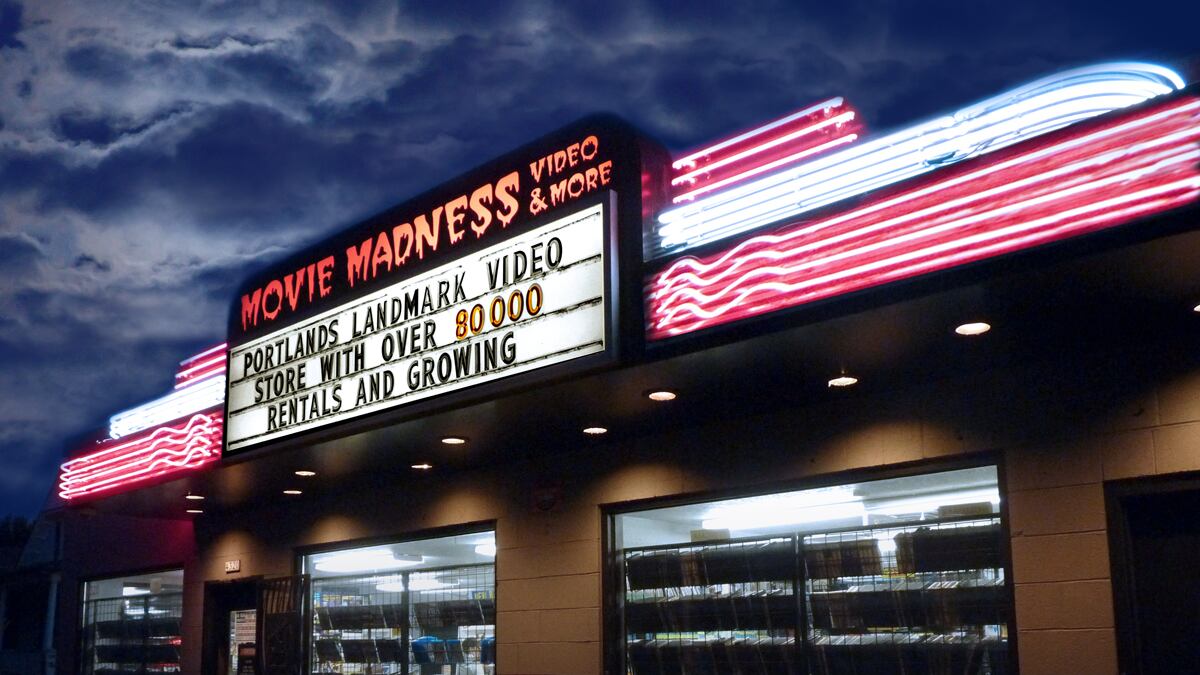One of the last and largest video stores in the United States, Movie Madness has devoted itself to historical preservation in recent years. Now, a new book returns that favor.
Chronicling Movie Madness’ evolution from hip local staple to cultural landmark, Movie Madness: 30 Years Behind the Counter at Portland’s Iconic Video Store (Floating World Comics, 56 pages, $15) originated as a net for overflowing memories.
When Movie Madness celebrated its 30th anniversary last April, former employees gathered digitally, sharing stories that they felt were too many and too valuable to exist only on Facebook threads, says Movie Madness general manager Matt Parnell.
“People who hadn’t talked in 20 years were suddenly reconnecting like they just got off work together yesterday,” says Parnell, who was first hired at Movie Madness in 2000 by founder and owner Mike Clark, who is his uncle.
Reunion recollections—from outlandish customer interactions to looking up crushes’ rental histories—became the book’s oral history of the store. Other highlights of the 60-page, zine-style tribute include an essay by Movie Madness devotee (oh, and revered director) Todd Haynes, a comprehensive conversation with Clark, and the tale of how Movie Madness became part of Hollywood Theatre.
Nate Ashley, the lead designer at Powell’s Books, fashioned the book to look like a tattered but vivid VHS box, complete with genre stickers like “Adventure” and “Bizarre” on various stories.
“I think it works really well as ‘let’s wallow in nostalgia for a minute,’ but it’s not just about Movie Madness in my mind,” says book editor and Hollywood Theatre director of education and community engagement Alison Hallett. “It’s also about this video store culture that doesn’t exist anymore.”
While the contemporary version of Movie Madness touts the artistic and cultural significance of its 90,000 titles, the book also pours amber around what Hallett calls “a little bit of the dirtbag ‘90s vibe.” That includes the store’s defunct adult film section, which is detailed in the book alongside an anonymous essay on bootlegging.
Recalling the spring-coiled racking of the porn corner’s saloon doors and dead-animal smells wafting from underneath the store’s old connective hallway, Parnell says current innovations like the Miniplex would’ve seemed unthinkable two decades ago. “That’s flying cars to the [2000] version of me,” he says.
While sense memory and ephemera abound, one of the book’s core themes is how Movie Madness’ library grew into a completist’s fantasy and slowly shifted the store’s self-concept.
In the 1990s, with 50 other video stores within a 5-mile radius (according to Clark), the store’s efforts to acquire titles beyond obvious new releases were simply good business. But as its famed subsections—organized by everything from director to cult-horror theme to country of origin—began to reflect the staff’s boundless movie appetites, its inventory graduated to being a collection.
By the time Clark was mulling retirement circa 2015, Parnell says even his entrepreneurial uncle couldn’t bear to let the movies themselves “disperse.” “I remember Mike saying, ‘What would Portland do?’” he says. “‘Where are people gonna get this movie or that movie?’”
Both Parnell and Hallett say they are struck by how much Movie Madness owes to 30 years of employee and customer tastes—with Hallett likening the store experience to a human “thumbprint” no streaming service can rival.
“Am I the only person who knows the answer to the question of what movie I should watch tonight?” she asks of algorithmic viewing habits. “I guarantee you the three people working the counter at Movie Madness have better ideas.”
In her chapter about managing the Hollywood’s 2017 donor-driven campaign to acquire Movie Madness, Hallett notes that rentals and memberships increased in 2018 and 2019. While the pandemic certainly took its bite out of business, Parnell is encouraged by the 150 to 200 new signups a month since resuming full business hours last summer.
As captured in the book, there’s glory and melancholy to being the last of any dying breed, but it’s also a potent reminder not to rest on any laurels.
Just last week, in fact, Movie Madness tracked down the sole missing entry in its Ingmar Bergman section. Parnell jokes the 1950 film’s title speaks directly to the store’s eternal attitude toward collection holes: This Can’t Happen Here.
